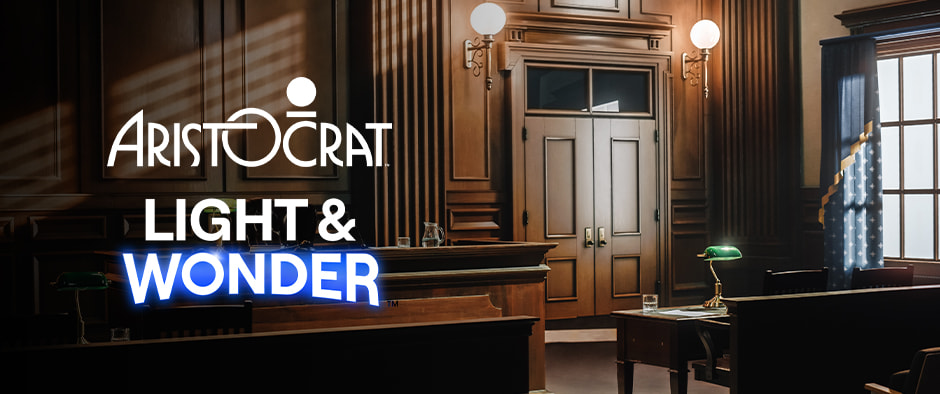Aristocrat’s IP Battle Over Dragon Link Game Proceeds in Court
Aristocrat’s lawsuit against Light & Wonder over copyright infringement and trade secrets will proceed, as a Nevada judge largely denied Light & Wonder’s motion to dismiss. The case involves Aristocrat’s Dragon Link and Light & Wonder’s Jewel of the Dragon slots. The court found sufficient evidence for most claims, allowing the lawsuit to proceed.

Aristocrat Gaming’s legal battle against Light & Wonder has taken a significant turn as a Nevada District Court judge largely denied Light & Wonder’s motion to dismiss the lawsuit.
The lawsuit, filed by Aristocrat in March, centers on allegations of copyright infringement and trade secret misappropriation related to its popular Dragon Link slot game. Light & Wonder, formerly known as Scientific Games, is accused of creating a similar game, Jewel of the Dragon, which Aristocrat claims was developed using confidential information.
Big Game, big wins. 🤑
Last night, a lucky guest scored $122,976.65 on our Dragon Link slot! 🎰🐲#CircaLasVegas #Jackpot pic.twitter.com/V0DiVu8aXn
— Circa Las Vegas (@CircaLasVegas) February 9, 2024
The judge’s decision to allow the majority of the claims to proceed marks a substantial victory for Aristocrat. In the lawsuit, Aristocrat alleges that Light & Wonder’s actions not only infringed on its copyright but also involved the misappropriation of trade secrets facilitated by ex-employee Emma Charles. Charles, who had previously worked on the Dragon Link project, is said to have shared protected information with her new employer, aiding in the development of Jewel of the Dragon.
Light & Wonder sought to have the lawsuit dismissed, arguing that Aristocrat had not provided sufficient evidence to support its claims. However, the court found that Aristocrat had indeed demonstrated enough evidence to move forward with the allegations of copyright infringement and trade secret misappropriation. This ruling means that Aristocrat can continue to pursue these claims in court.
While the court sided with Light & Wonder on the issue of trade dress—dismissing this portion of the lawsuit on technical grounds—it left open the possibility for Aristocrat to amend its complaint. Additionally, the court dismissed claims related to deceptive trade practices but granted Aristocrat the opportunity to revise and refile these claims. With the stay on discovery lifted, the lawsuit is poised to advance to the next phase, bringing Aristocrat one step closer to potentially securing a favorable outcome.
Details of the Lawsuit
Aristocrat’s lawsuit against Light & Wonder is rooted in serious allegations of copyright infringement and trade secret misappropriation. At the heart of the dispute are two slot games: Aristocrat’s Dragon Link and Light & Wonder’s Jewel of the Dragon.
Jewel Of The Dragon or Wheel of Fortune? 🤔
21+ Gambling problem? Call 1-877-770-STOP pic.twitter.com/4mwMDwP7M8
— @QueenBatonRouge (@queenbatonrouge) February 10, 2024
Aristocrat contends that Jewel of the Dragon is a blatant copy of Dragon Link, created using confidential information that was improperly shared by a former Aristocrat employee.
The lawsuit, initiated in March, outlines how Emma Charles, a former employee of Aristocrat who worked on the Dragon Link project, joined Light & Wonder and allegedly divulged protected details about the game. Aristocrat asserts that this breach of trust enabled Light & Wonder to develop Jewel of the Dragon, which closely mirrors Dragon Link in both gameplay mechanics and visual elements.
Besides copyright infringement, Aristocrat accuses Light & Wonder of misappropriating trade secrets, a serious charge involving using confidential business information without permission. According to Aristocrat, the knowledge transferred by Charles was pivotal in creating Jewel of the Dragon, effectively giving Light & Wonder an unfair advantage in the market.
Light & Wonder has vigorously denied these allegations, seeking to have the lawsuit dismissed on the grounds that Aristocrat failed to present sufficient evidence. Despite these efforts, the court found that Aristocrat had provided enough preliminary evidence to substantiate its claims of copyright infringement and trade secret misappropriation, allowing these key aspects of the lawsuit to move forward.
Court’s Decision
The court’s decision in the case between Aristocrat and Light & Wonder was largely favorable to Aristocrat. The judge ruled that Aristocrat had presented sufficient evidence to support its claims of copyright infringement and trade secret misappropriation, allowing these allegations to proceed. This decision represents a significant step forward for Aristocrat in its legal battle to protect its intellectual property.
However, the court did dismiss certain aspects of the lawsuit. Specifically, the judge dismissed the trade dress claims on technical grounds, stating that Aristocrat’s description did not provide “fair notice” to Light & Wonder. The deceptive trade practices claim was dismissed due to a lack of detailed explanation. Both dismissals were granted with leave to amend, giving Aristocrat the opportunity to revise and resubmit these claims in the future.
Responses from the Parties
Following the court’s decision, Aristocrat expressed satisfaction with the ruling. A spokesperson for Aristocrat stated, “We are pleased that the court has upheld a number of our substantive claims in this ruling and will continue to strongly protect our intellectual property.” This statement underscores Aristocrat’s commitment to pursuing the case and safeguarding its proprietary games and technologies.
Aristocrat chair on top talent joining competitors, especially Light & Wonder pic.twitter.com/QQBOWAo1Li
— Stephen Mayne (@MayneReport) February 22, 2024
Light & Wonder has chosen not to comment on the ongoing litigation. The company, which had sought to dismiss the entire lawsuit, now faces the prospect of defending itself against the remaining claims of copyright infringement and trade secret misappropriation. The silence from Light & Wonder suggests a strategic decision to avoid public discussion while the case proceeds through the legal system.
The ongoing court battle could also impact the best USA betting sites. As the American market is proving profitable, it wouldn’t be a surprise to see many employees ‘headhunted’ by rivals, who in turn will be desperate to keep their in-house trade secrets secure.
The judge’s ruling has also lifted the stay on discovery, meaning that both parties can now gather evidence and build their cases. This development indicates that the lawsuit will continue progressing, with each side preparing to present their arguments in court.
The outcome of this case could have significant implications for the gaming industry, particularly regarding the protection of intellectual property and the consequences of misappropriating trade secrets.



